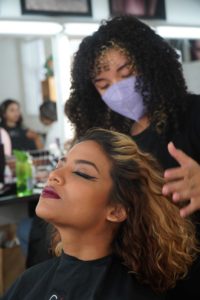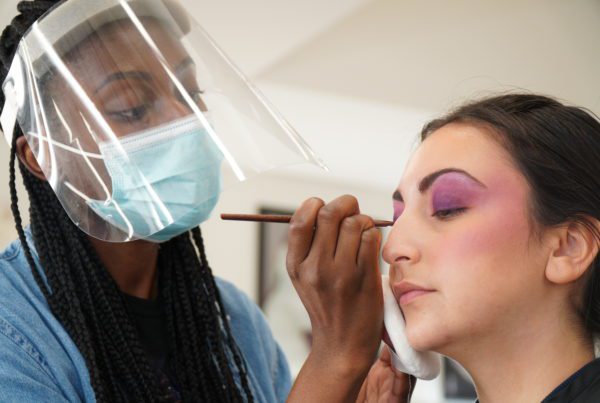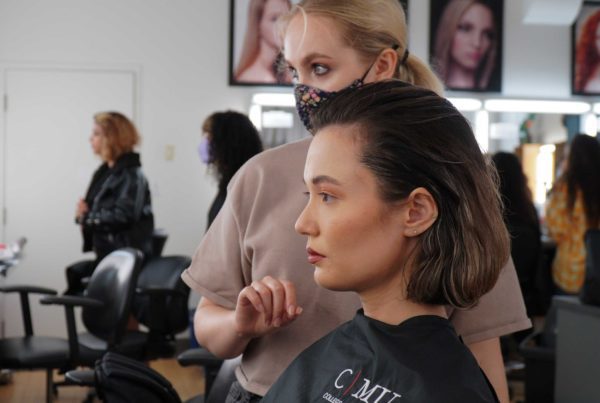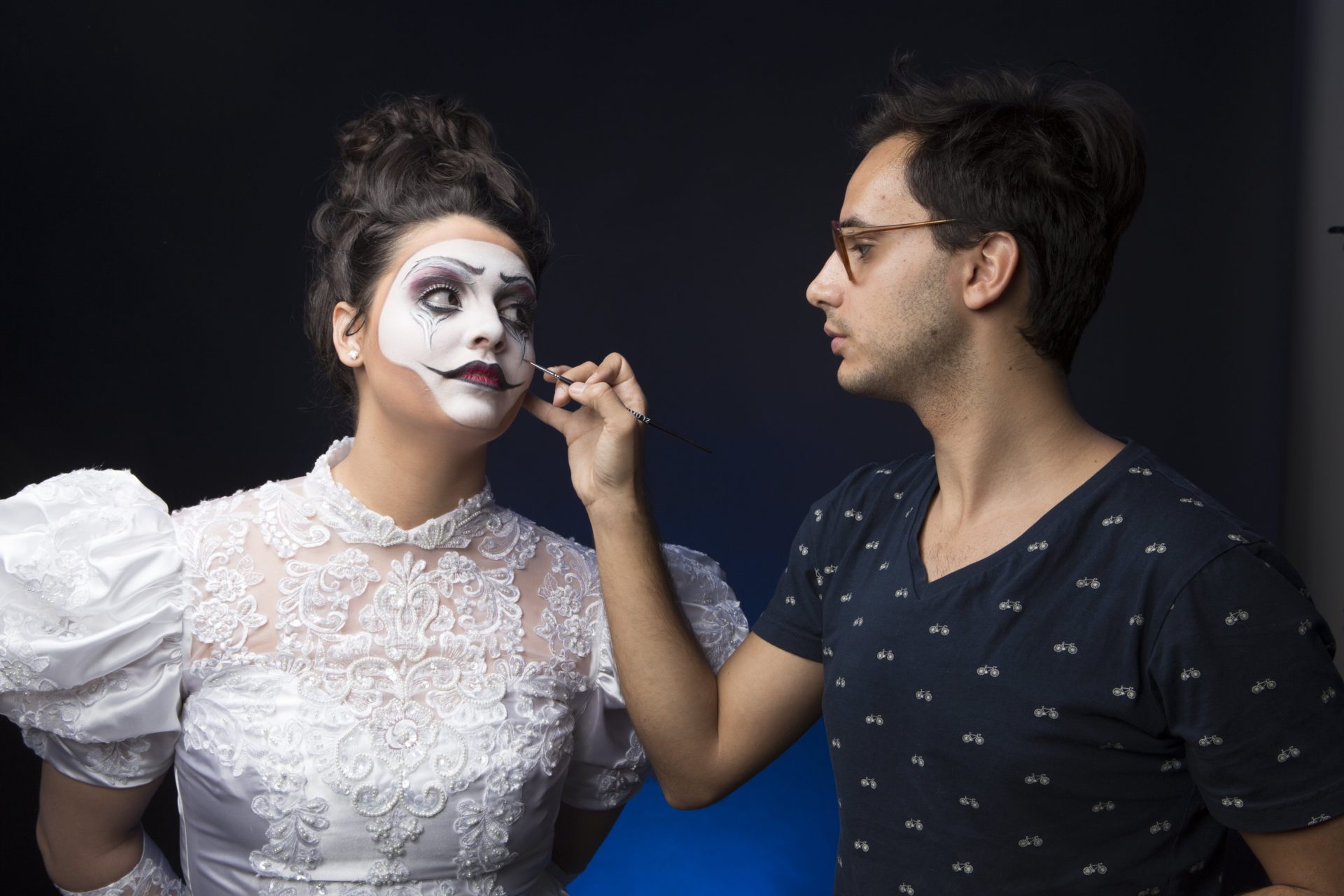
The beauty industry is booming. With the rise of social media platforms like Instagram and YouTube, aspiring makeup artists have more opportunities than ever.
But the field of makeup artistry is constantly evolving. So is it still enough to attend a beauty school? Or is it better to work under a licensed professional?
Here we explore the necessary steps to build your makeup artist career. Get a good makeup education, develop your skills, and find networking avenues.
What Is the Meaning of Makeup Artistry?
Simply put, a makeup artist (MUA) is an artist whose medium is the human face and body. A makeup artist’s job is to apply makeup on people, sometimes with other prosthetics for theatre, television, film, fashion, and magazine productions.
Why Professional Make-up is Required
Makeup artistry is an essential profession in the modeling industry. It includes many aspects such as:
- Applying makeup professionally
- Creating different types of looks
- Choosing colours and matching the models’ appearances according to the desired concepts from a designer or director.
You can start becoming a makeup artist by practicing yourself before going to a makeup school.
These days, there are even colleges teaching makeup artistry, like CMU College, which divides its curriculum into several departments according to specialized fields.
To become a professional makeup artist, it’s helpful to have the following traits.
Visual skills
Makeup artists depend heavily on their visual skills.
A makeup artist must understand how to mix colours, blend textures, and apply shadows.
In addition, a good artist works with different materials such as powders, creams, gels, liquids, and pencils.
Another skill is reading patterns and shapes and understanding how light interacts with objects.
A talented makeup artist would understand how to render things creatively. So learning the basics of traditional visual arts will be helpful. And taking art classes, for example, will be an asset in the long run.
Dexterity
Let’s face it. You need dexterous hands to become a good makeup artist. Having clumsy hands would make this career a struggle.
You’ll need to know how to apply cosmetics in the correct way using your hands. Creating precise lines is usually the staple of makeup artistry. That’s why you must have steady hands.
Getting used to using tools with both your dominant and non-dominant hand will help. It will allow you to work with both hands and multitask – a must in makeup artistry.
Attention to detail
When you become a makeup artist, strong attention to detail becomes necessary to achieve a specific look requested by the client. This might include applying products in a particular order or using different shades of eyeshadow to give depth and texture to a model’s appearance.
Try learning more about ideas/topics related to makeup so you can access that additional knowledge whenever the occasion calls for it.
Practice and experience
There’s no better way to become a professional makeup artist than to practice and get experience.
Take classes, read books and magazines, watch videos, talk to people who already work in the field, and keep up with trends.
You can start this by first doing your makeup and then offering to do makeup for your family and friends.
Take photos of progress
Taking photos of your work, even though not all of them will go into a portfolio, can help you learn early about lighting and presentation.
Take advantage of social media by posting videos and pictures of your work, asking questions, and offering tips.
How to Become a Makeup Artist
Going to a makeup school is a good start. However, to become a successful makeup artist, you must also gain hours of experience.
Build a solid portfolio, and find opportunities wherever possible. Let’s delve into these areas.
Invest in Your Education
A good makeup school offers classes such as basic makeup, hair styling, skin care, nail art, and more.
You’ll learn how to apply products safely and effectively. Furthermore, you’ll also gain experience working under professional instructors.
Enrollment pre-requisites
Professional makeup programs vary widely. Some schools require students to complete high school or GED requirements. In contrast, others allow students to enroll directly into a diploma program.
Find both practical and theory options
With so many options, it’s ideal to find a school that lets you have a quality formal education and practical skills.
Look into what type of curriculum each program offers and if they have what you need to master the art.
CMU College, for example, offers makeup courses for fashion, film, and television, theatre, prosthetics, hairstyling, creature and character design, digital sculpting, and essential Photoshop skills.
A diverse program such as this will ensure you have a specialization that can advance your career on a faster track.
Gain Relevant Work Experience
The best way to gain experience as a makeup artist is to practice, practice and practice. But don’t stop by doing just makeup.
Working in a relevant job field can be a helpful experience too.
Of course, it would be ideal if you could experience hands-on work in the industry, so keep an eye out for any job listings and opportunities.
However, if you know someone who wants to build a modeling portfolio, don’t hesitate to offer to do their makeup. Yes, even for free, so you can get the experience.
Or, if you have the chance to do someone’s wedding makeup, don’t pass it up.
If you don’t find makeup opportunities while learning?
If you haven’t found that chance yet, don’t despair. While we wouldn’t go as far as recommending you to work in a bank or a hospital, working as a barista, for example, will help you hone your communication and customer service skills – other vital skills you will need in the trade.
Try looking for a theatre or photography studio job to supplement your knowledge as a makeup artist. You may even work for a magazine as a stylist or editor while learning more about makeup.
Build A Portfolio
A makeup artist should show off their work, skills, and personality by creating a professional portfolio.
The easiest way to do this is to set up a website or use social media as a platform to showcase your makeup skills and best works.
Your online portfolio should include images of you applying makeup, including closeups of your hands and face. In addition, showcase your work, what products you use, and why you’re good at what you do.
Also, include information about yourself, like where you went to school, your educational background, and anything else relevant to your field.
Look For Jobs or Become A Freelancer
What better way to do this than to jump right into the workforce and start doing it like a professional?
If you’re able to find clients with paid projects, that is great.
However, even if you’re just a freelance artist, take advantage of being able to shadow someone more experienced in the job. You can see how they do their job as a makeup artist and follow their examples.
Finding a mentor
Sign up if you’re lucky enough to find a mentorship program! This is an invaluable resource in which you can learn side-by-side with a professional and experience firsthand what the job is like.
By working directly in the field, you can also get referrals and testimonials from your clients. When people refer you, it’s a good indication that you’ve done a pleasing job.
What Makes A Good Makeup Artist?
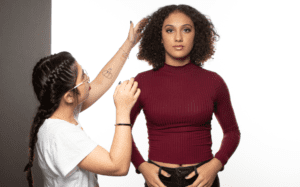
So, what makes a makeup artist good? To become a good, successful makeup artist, it’s essential you have a particular set of skills. They include the following skills:
Extensive makeup skills
Every makeup artist must already master the basics of applying makeup correctly. But since the beauty and makeup industry constantly evolves, every artist has to go beyond the basics.
For example, knowing how to properly contour a subject’s face or highlight a subject’s eyes, will, of course, play a big part in your makeup business.
However, would you know how to create an elegant look for an haute couture fashion show or a dramatic look for a play? Well, extensive knowledge of makeup will give you the confidence to do this and elevate your career to a new level.
So don’t limit yourself, and always take the opportunity to broaden your knowledge as a makeup artist.
Join the Complete Makeup Artist Program or Comprehensive Makeup Artist Program to learn more about the different styles of makeup and how you can grow your skills by studying them.
Communication skills
Communication skills are vital for a makeup artist because it helps you connect with people. If you don’t communicate effectively, you won’t be able to build relationships with customers and ultimately grow your brand.
Developing excellent communication skills doesn’t have to be complicated. For example, you can start by listening to someone without interrupting.
Showing friendliness, confidence, empathy, and open-mindedness is the next steps in building effective communication. Remember always to be clear and concise. Respecting the people you talk to is also a must.
With these points in mind, you’ll be a good communicator, and people will respond to you positively.
Hairstyling skills
Never underestimate the need for a fabulous hairstyle to go along with your fantastic makeup.
Having hairstyling skills is invaluable in your job as a makeup artist. Not only will it be helpful to create a complete look, but it also reduces the risk of someone else ruining the makeup concept you have for your subjects.
Sharing professional ideas
If you don’t have any ideas on what to do with your subject’s hairstyle, you can always learn from other makeup artists. In fact, sharing professional ideas is what all makeup artists should do to build their careers.
You can share pro tips by building your own MUA website or starting a video blogging channel so you can start communicating with other makeup artists.
Sharing your knowledge with others will potentially open up an exchange of ideas between fellow professionals and you will no longer be in the dark about anything.
Attention to detail
Makeup artists must pay close enough attention to every detail of their clients’ faces to ensure they look flawless, including everything from eyelash length to eye colour, and even down to the placement of freckles.
But it doesn’t stop there. A makeup artist must also know how to prioritize tasks effectively. This will ensure they don’t spend hours perfecting one small aspect of their client’s makeup while forgetting another essential step.
Time management skills
In addition to learning how to communicate effectively with people and paying close attention to every little thing, makeup artists must also master time management skills.
It can take hours to put on makeup on the job. However, some occasions call for speed, such as when you are in charge of handling many models for fashion shows or having many extras to serve.
Timing is a vital point, so you never lose a job because you’re not putting on makeup quickly enough or not having enough time to do it.
Prioritize the jobs you get
If it looks like the job is not worth your time, consider dropping it for a job that is more rewarding.
Prioritizing your tasks in a job is highly recommended to work efficiently with little to no mistakes.
Networking as a Makeup Artist
We don’t have to tell you this enough. It is vital to network like crazy. As a makeup artist, you’ll need connections to make it in the industry.
It’s easier for a makeup artist to get hired by knowing the right people.
Here are ways you can network as a makeup artist.
Use social media to connect with other makeup artists
Social media is excellent for connecting with people, finding jobs, learning about products, and getting inspiration. But it’s also where you can show off your work and showcase your talents.
If you want to use social media to find clients, see these tips to help you connect with others in the beauty industry.
- Share photos of yourself doing makeup
- Create a comprehensive profile on your social media accounts
- Post videos showing how you apply makeup
- Join groups related to your field
- Follow other makeup artists and influencers in your niche
- Comment on posts relevant to your business
Expand your network at events and shoots
Every event and shoot you book needs to be treated like a networking event. You never know who you might meet there. And, even if you don’t meet anyone, you still learn how to interact with people.
People love talking about themselves. Therefore, you can use those conversations to help build relationships with potential clients.
Make sure you are prepared to take advantage of opportunities that present themselves.
Don’t turn down the chance to network. Instead, say yes, and tell them why you think you could be helpful. Then, follow up later to see where things go.
Frequently Asked Questions
What additional skills should a makeup artist have?
Several additional skills would be helpful for professional makeup artists.
Skincare
A makeup artist needs to know basic skincare routine (cleansing, exfoliating, and moisturizing) to prepare a smooth base for makeup. Without a good base, the makeup will not look as good.
If you don’t know about your subject’s skin type, you won’t be able to know the right cosmetic products to put on it.
Hygiene
Practicing good hygiene is always helpful.
As a makeup artist, you don’t want to spread illness by using a dirty brush on your client’s face. Remember to wash your hands before applying any makeup.
Always clean your tools and never share them with anyone, even with a fellow makeup artist. It’s also a good idea to disinfect your station before and after you do a job.
Colour Theory
Colour theory is an essential part of a makeup artist’s knowledge. For instance, makeup artists must figure out which concealer shades can conceal discolouration.
Colour matching is also essential for a makeup artist. The wrong foundation shade can make your subject too pale or too cakey.
What career options are there for makeup artistry students?
You can be a fashion makeup artist. Working for a fashion brand or a fashion magazine is typical in this career field.
Makeup in the fashion industry usually requires a specific skill set to accommodate fashion lighting and designers’ concepts.
It’s also possible to work in film, TV, or theatre as part of creature or character creation. There’s a reason many awards shows in the film industry hand out trophies to the best makeup artists. They can age an actor or create a monster using prosthetics or wigs.
Digital effects makeup artists have even more limitless possibilities with their creativity. Whether for a video game or an animated movie, you can create concepts for different looks that digital effects will bring to life.
What does makeup artistry school teach?
A curriculum in a makeup artistry school can vary significantly from one another. However, most beauty schools will teach you the basics. These include essential makeup techniques, building a makeup kit, facial shapes and characteristics, contouring and highlighting, accentuating the natural curves of a person’s face, and many others.
However, a great school will also teach makeup artists additional skills in business and management. These are useful for students to run their own businesses in the future.
It’s also beneficial for freelance makeup artists to have a strong business sense.
For instance, CMU College has programs for digital effects makeup.
This school also teaches fashion, photographic makeup, theatrical makeup, special effects makeup, and prosthetics.
How should I display my portfolio?
Here are some tips for a makeup artist to display a successful portfolio site:
- Be comprehensive. Write about your experiences and education but do not include superficial information that is not related to your work.
- Mind the aesthetics. Create an aesthetically pleasing design for your portfolio so future employers have faith in your artistry. You can hire a web or layout designer for your portfolio.
- Add videos. Videos allow you to create makeup tutorials and demonstrate your talent.
- Consider adding a blog. Blogging allows you to write about your experiences, techniques, and insights into the industry. Blogs help potential clients learn more about you and your work.
Browse Programs at CMU
CMU College offers many makeup artistry programs. Some have already been mentioned above, but you will find even more programs to level up your skills:
- Global Makeup Artist Program
- Total Fashion Makeup Artist Program
- Photographic & Studio Hairstyling Program
- Creature Design Certificate
- Digital FX Makeup Effects Artist Program
- Double Diploma Opportunity
Learn more about CMU’s makeup artistry programs by booking a tour.
Take the first step in your journey as a makeup artist with CMU College. You’re well on your way to a brilliant career as a professional makeup artist.

